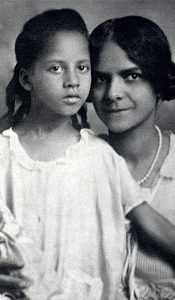
When we interviewed Mrs. Ransom, motherhood emerged as a strong theme, not only because she’s a mother of eight, but also because of the way she talked about her own mother and her older sister, who played a maternal role in her life.
The story she told us about realizing she wouldn’t be welcomed at the park is haunting, partly because of the matter-of-fact way her mother tells her, “When they say ‘everyone,’ they don’t mean us.”
It helped me understand that for mothers raising children during segregation, these conversations must have been common, part of the responsibility a mother has for helping her child deal with hard truths. And while life presents enough hard truths on its own, teaching a child to navigate the meanness of segregation must’ve kicked this role into overdrive.
In editing the video, I chose to amplify this theme by visually representing its application to many mothers and children across generations. Missouri State’s Katherine Lederer Collection was a critical source in making these visuals happen because, included in Dr. Lederer’s collection of photographs and artifacts related to Springfield’s African American community, there are a number of beautiful portraits of children.
There were many more available than I could use in “Betty’s Story,” and in reviewing them, I gained new understanding of countless conversations between mothers and their children, conversations that must have often concluded: “When they say ‘everyone,’ they don’t mean us.”
